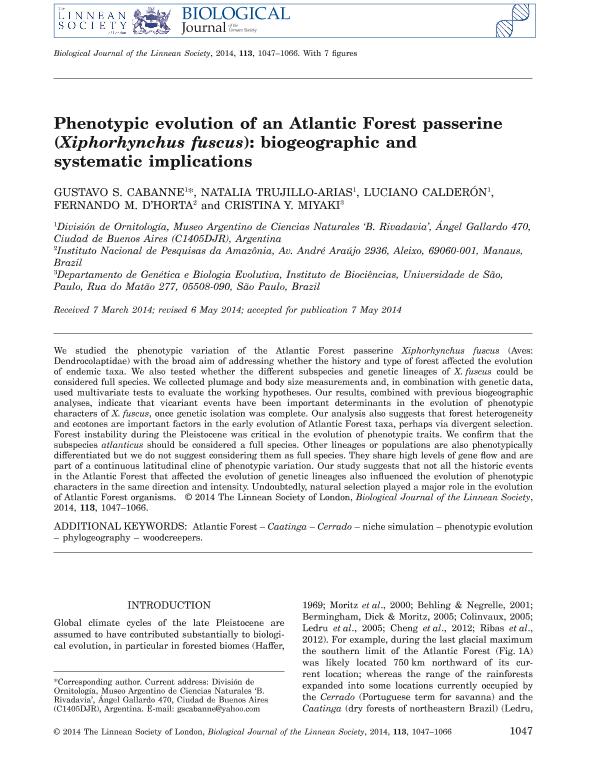Mostrar el registro sencillo del ítem
dc.contributor.author
Cabanne, Gustavo Sebastián

dc.contributor.author
Trujillo Arias, Natalia

dc.contributor.author
Calderón, Pablo Luciano Sebastian

dc.contributor.author
d'Horta, Fernando M.
dc.contributor.author
Miyaki, Cristina Y.
dc.date.available
2017-12-04T22:20:24Z
dc.date.issued
2014-11
dc.identifier.citation
Cabanne, Gustavo Sebastián; Trujillo Arias, Natalia; Calderón, Pablo Luciano Sebastian; d'Horta, Fernando M.; Miyaki, Cristina Y.; Phenotypic evolution of an Atlantic Forest passerine (Xiphorhynchus fuscus): biogeographic and systematic implications; Oxford University Press; Biological Journal Of The Linnean Society; 113; 4; 11-2014; 1047-1066
dc.identifier.issn
0024-4066
dc.identifier.uri
http://hdl.handle.net/11336/29677
dc.description.abstract
We studied the phenotypic variation of the Atlantic Forest passerine Xiphorhynchus fuscus (Aves: Dendrocolaptidae) with the broad aim of addressing whether the history and type of forest affected the evolution of endemic taxa. We also tested whether the different subspecies and genetic lineages of X. fuscus could be considered full species. We collected plumage and body size measurements and, in combination with genetic data, used multivariate tests to evaluate the working hypotheses. Our results, combined with previous biogeographic analyses, indicate that vicariant events have been important determinants in the evolution of phenotypic characters of X. fuscus, once genetic isolation was complete. Our analysis also suggests that forest heterogeneity and ecotones are important factors in the early evolution of Atlantic Forest taxa, perhaps via divergent selection. Forest instability during the Pleistocene was critical in the evolution of phenotypic traits. We confirm that the subspecies atlanticus should be considered a full species. Other lineages or populations are also phenotypically differentiated but we do not suggest considering them as full species. They share high levels of gene flow and are part of a continuous latitudinal cline of phenotypic variation. Our study suggests that not all the historic events in the Atlantic Forest that affected the evolution of genetic lineages also influenced the evolution of phenotypic characters in the same direction and intensity. Undoubtedly, natural selection played a major role in the evolution of Atlantic Forest organisms.
dc.format
application/pdf
dc.language.iso
eng
dc.publisher
Oxford University Press

dc.rights
info:eu-repo/semantics/openAccess
dc.rights.uri
https://creativecommons.org/licenses/by-nc-sa/2.5/ar/
dc.subject
Evolución
dc.subject
Plumaje
dc.subject
Morfología
dc.subject
Selva Atlántica
dc.subject.classification
Otras Ciencias Biológicas

dc.subject.classification
Ciencias Biológicas

dc.subject.classification
CIENCIAS NATURALES Y EXACTAS

dc.title
Phenotypic evolution of an Atlantic Forest passerine (Xiphorhynchus fuscus): biogeographic and systematic implications
dc.type
info:eu-repo/semantics/article
dc.type
info:ar-repo/semantics/artículo
dc.type
info:eu-repo/semantics/publishedVersion
dc.date.updated
2017-12-04T20:04:23Z
dc.journal.volume
113
dc.journal.number
4
dc.journal.pagination
1047-1066
dc.journal.pais
Reino Unido

dc.journal.ciudad
Oxford
dc.description.fil
Fil: Cabanne, Gustavo Sebastián. Consejo Nacional de Investigaciones Científicas y Técnicas. Oficina de Coordinación Administrativa Parque Centenario. Museo Argentino de Ciencias Naturales "Bernardino Rivadavia"; Argentina
dc.description.fil
Fil: Trujillo Arias, Natalia. Consejo Nacional de Investigaciones Científicas y Técnicas. Oficina de Coordinación Administrativa Parque Centenario. Museo Argentino de Ciencias Naturales "Bernardino Rivadavia"; Argentina
dc.description.fil
Fil: Calderón, Pablo Luciano Sebastian. Consejo Nacional de Investigaciones Científicas y Técnicas. Oficina de Coordinación Administrativa Parque Centenario. Museo Argentino de Ciencias Naturales "Bernardino Rivadavia"; Argentina
dc.description.fil
Fil: d'Horta, Fernando M.. Ministério da Ciência, Tecnologia, Inovações. Instituto Nacional de Pesquisas da Amazônia; Brasil
dc.description.fil
Fil: Miyaki, Cristina Y.. Universidade de Sao Paulo; Brasil
dc.journal.title
Biological Journal Of The Linnean Society

dc.relation.alternativeid
info:eu-repo/semantics/altIdentifier/doi/http://dx.doi.org/10.1111/bij.12362
dc.relation.alternativeid
info:eu-repo/semantics/altIdentifier/url/https://academic.oup.com/biolinnean/article/113/4/1047/2415834
Archivos asociados
